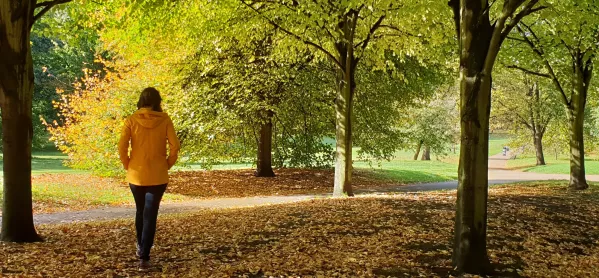The times when teachers absolutely should be selfish

The profession of teaching can inspire some fairly ridiculous phrases. For me, anything that includes the word “selfless” in its encapsulation of what makes a good teacher makes me particularly irritated.
If you put “selfless teachers” into Google, you will find an even more infuriating quotation: “A good teacher is like a candle, it consumes itself to light the way for others.”
This delightful piece of advice is also available on a mug, just in case you would like a permanent reminder of how essential literally burning out is for a good teacher.
Wellbeing: 3 ways our school prioritises teacher wellbeing
Quick read: True resilience means knowing when to give up
After Covid: 5 ways to increase participation in quiet classrooms
More from Jamie Thom: When teachers should say ‘no’ - and how to do it
Parent-teachers: A brief survival guide for teachers with small children
A piece of wisdom I am much fonder of comes from the Dalai Lama, who encourages people to adopt a position of “wise selfishness”. Essentially, this comes down to making sure that we are prioritising things that make us the best version of ourselves, in order to do as much good and be as compassionate as we can.
With the clocks having just gone back, and as winter approaches, this advice is vitally important. So, what should teachers apply this “wise selfishness” to?
1. Sleep
In his excellent book Why We Sleep, Matthew Walker includes a particularly memorable phrase about the dangers of not getting enough sleep: “The shorter your sleep, the shorter your life.”
During term time, we teachers are guilty of scornfully rejecting sleep in favour of getting through the marking pile or planning another masterpiece lesson.
As the father of two young children who have appeared to have signed a non-sleeping contract between them, I am all too familiar with how poorly we function on insufficient sleep. We cannot bring the best version of ourselves to the classroom without it.
So, here’s what we might want to “selfishly” prioritise: having an hour of work-free and technology-free activity before bed; trying to get at least seven hours of sleep; sticking to a consistent sleep routine; cutting down on the caffeine. The marking can wait, but sleep - here we come.
2. Family first
I’m sure I’m not alone in being very clear that in 10 years, I don’t want to look back and wish I had spent more time with my young children and family. As much as I value teaching and want to do the best I can for young people, they are fundamentally much more important.
If that means at times that a spreadsheet has to wait to be filled in, or that an email waits for a reply, so be it. It also means that I long ago shed the notion of the importance of “visibility” in school. At the start of my teaching career, I stayed late and I arrived early - I was in a culture that celebrated this as being “committed”. Now I leave when the bell rings at the end of the day and work much more flexibly.
3. Detachment
This will be gloriously unique for us all. We need to know what helps us to switch off from our work in schools, and be ruthless in making the time to do it. I worked with a brilliant deputy head who was a keen birdwatcher, and another teacher who was a cage fighter (don’t ask). Both were so much better and more interesting as a result of these non-school activities.
Whatever helps us to step outside the rapid conveyer belt of work in schools will help us come back refreshed and galvanised for the start of another school day.
While this idea of “wise selfishness” might seem idealistic, adhering to another Dalai Lama quote might help us to prioritise our own needs in order to do more good for others: “Choose to be optimistic, it feels better.”
Jamie Thom is a teacher of English and an author, based in Scotland. He tweets @teachgratitude1 and his latest book is Teacher Resilience: managing stress and anxiety to thrive in the classroom
You need a Tes subscription to read this article
Subscribe now to read this article and get other subscriber-only content:
- Unlimited access to all Tes magazine content
- Exclusive subscriber-only stories
- Award-winning email newsletters
Already a subscriber? Log in
You need a subscription to read this article
Subscribe now to read this article and get other subscriber-only content, including:
- Unlimited access to all Tes magazine content
- Exclusive subscriber-only stories
- Award-winning email newsletters
topics in this article



